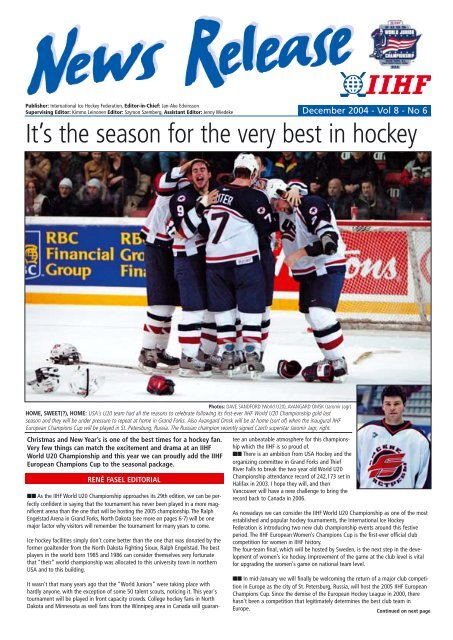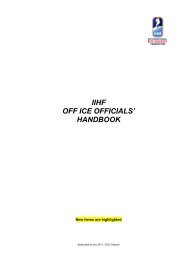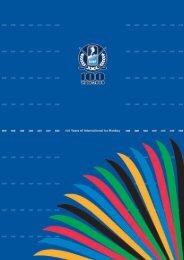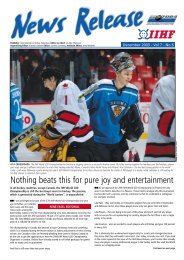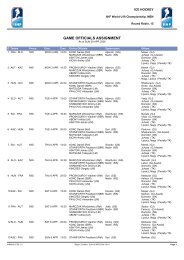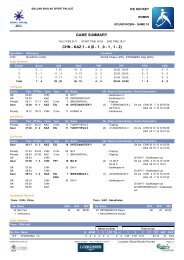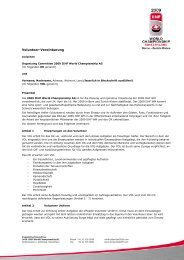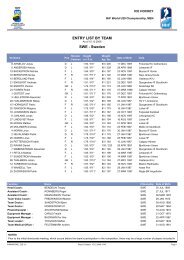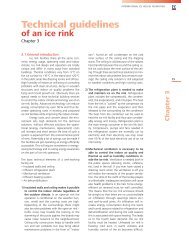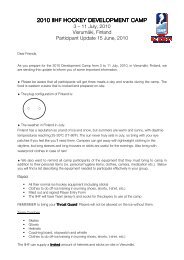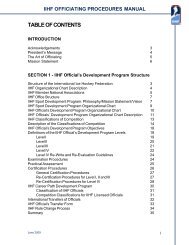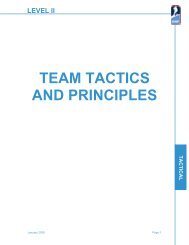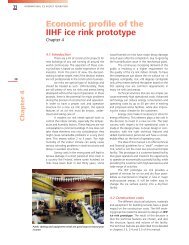Vol 8 - No 6 - IIHF
Vol 8 - No 6 - IIHF
Vol 8 - No 6 - IIHF
Create successful ePaper yourself
Turn your PDF publications into a flip-book with our unique Google optimized e-Paper software.
Publisher: International Ice Hockey Federation, Editor-in-Chief: Jan-Ake Edvinsson<br />
Supervising Editor: Kimmo Leinonen Editor: Szymon Szemberg, Assistant Editor: Jenny Wiedeke<br />
Christmas and New Year’s is one of the best times for a hockey fan.<br />
Very few things can match the excitement and drama at an <strong>IIHF</strong><br />
World U20 Championship and this year we can proudly add the <strong>IIHF</strong><br />
European Champions Cup to the seasonal package.<br />
■■ As the <strong>IIHF</strong> World U20 Championship approaches its 29th edition, we can be perfectly<br />
confident in saying that the tournament has never been played in a more magnificent<br />
arena than the one that will be hosting the 2005 championship. The Ralph<br />
Engelstad Arena in Grand Forks, <strong>No</strong>rth Dakota (see more on pages 6-7) will be one<br />
major factor why visitors will remember the tournament for many years to come.<br />
Ice hockey facilities simply don’t come better than the one that was donated by the<br />
former goaltender from the <strong>No</strong>rth Dakota Fighting Sioux, Ralph Engelstad. The best<br />
players in the world born 1985 and 1986 can consider themselves very fortunate<br />
that “their” world championship was allocated to this university town in northern<br />
USA and to this building.<br />
It wasn’t that many years ago that the “World Juniors” were taking place with<br />
hardly anyone, with the exception of some 50 talent scouts, noticing it. This year's<br />
tournament will be played in front capacity crowds. College hockey fans in <strong>No</strong>rth<br />
Dakota and Minnesota as well fans from the Winnipeg area in Canada will guaran-<br />
tee an unbeatable atmosphere for this championship<br />
which the <strong>IIHF</strong> is so proud of.<br />
■■ There is an ambition from USA Hockey and the<br />
organizing committee in Grand Forks and Thief<br />
River Falls to break the two year old World U20<br />
Championship attendance record of 242,173 set in<br />
Halifax in 2003. I hope they will, and then<br />
Vancouver will have a new challenge to bring the<br />
record back to Canada in 2006.<br />
December 2004 - <strong>Vol</strong> 8 - <strong>No</strong> 6<br />
It’s the season for the very best in hockey<br />
Photos: DAVE SANDFORD (World U20), AVANGARD OMSK (Jaromir Jagr)<br />
HOME, SWEET(?), HOME: USA’s U20 team had all the reasons to celebrate following its first-ever <strong>IIHF</strong> World U20 Championship gold last<br />
season and they will be under pressure to repeat at home in Grand Forks. Also Avangard Omsk will be at home (sort of) when the inaugural <strong>IIHF</strong><br />
European Champions Cup will be played in St. Petersburg, Russia. The Russian champion recently signed Czech superstar Jaromir Jagr, right.<br />
RENÉ FASEL EDITORIAL<br />
As nowadays we can consider the <strong>IIHF</strong> World U20 Championship as one of the most<br />
established and popular hockey tournaments, the International Ice Hockey<br />
Federation is introducing two new club championship events around this festive<br />
period. The <strong>IIHF</strong> European Women’s Champions Cup is the first-ever official club<br />
competition for women in <strong>IIHF</strong> history.<br />
The four-team final, which will be hosted by Sweden, is the next step in the development<br />
of women’s ice hockey. Improvement of the game at the club level is vital<br />
for upgrading the women's game on national team level.<br />
■■ In mid-January we will finally be welcoming the return of a major club competition<br />
in Europe as the city of St. Petersburg, Russia, will host the 2005 <strong>IIHF</strong> European<br />
Champions Cup. Since the demise of the European Hockey League in 2000, there<br />
hasn’t been a competition that legitimately determines the best club team in<br />
Europe.<br />
Continued on next page
December 2004 - <strong>Vol</strong> 8 - <strong>No</strong> 6<br />
Continued from page one:<br />
■■ After several years of investigating the best possible<br />
format and time, the <strong>IIHF</strong>, together with the national<br />
associations and their leagues, decided on a set-up<br />
that brings the reigning national champions of the top<br />
six ranked countries in Europe together for a long<br />
weekend on January 13-16.<br />
One of the most captivating discussions among hockey<br />
fans concerns which league in Europe is the best. Is<br />
the Russian league really as good as they say? The<br />
Swedes are convinced that the Elitserien is the prime<br />
league in Europe. The Germans claim that the DEL is<br />
Europe’s answer to the NHL, while the Czechs and<br />
Finns claim that their top teams can compete with<br />
anyone on the continent.<br />
And this is why the <strong>IIHF</strong> Champions Cup is such an<br />
important event -- it will give answers to at least some<br />
of these questions and, above all, tell us which is the<br />
best club team in Europe.<br />
■■ In the future, we would like to take this one step<br />
further - to have the best team in Europe taking on<br />
the Stanley Cup champion for world club supremacy.<br />
2<br />
International Ice Hockey Federation<br />
Brandschenkestrasse 50<br />
Postfach 8039 Zürich, Switzerland<br />
Phone: +41-1-562 22 00, Fax: +41-1-562 22 29<br />
Internet: www.iihf.com E-mail: office@iihf.com<br />
René Fasel<br />
<strong>IIHF</strong> President<br />
Money is up but scoring<br />
is down in Russian league<br />
In the old Soviet league players didn’t earn much, but<br />
they scored plenty of goals.<br />
Things are quite different in the era of the PHL, the<br />
high-salary, pro hockey league of Russia. Today, scoring<br />
there is almost as meager as it was in the Italian<br />
soccer league during the infamous 1960s era of<br />
“catenaccio”, the very defensive style which led to<br />
many games finishing with 0-0 scores.<br />
Since the 1996-1997 season, there have been 30, 0-0<br />
games in the Russian league. During the current 2004-<br />
2005-season (September - <strong>No</strong>vember), the PHL teams<br />
have produced nine scoreless games.<br />
This can be compared to the Swedish league which<br />
played 14 scoreless games in the last nine seasons and<br />
only one during this campaign. The undisputed champion<br />
of defensive hockey is Lada Togliatti. The club has<br />
taken part in 14, 0-0 games since 96-97, with five of<br />
them played during the last (03-04) season.<br />
The goals-per-game average in the Russian league as<br />
of mid-<strong>No</strong>vember is a paltry 4.22. The number can be<br />
compared to the Swiss league’s 5.98 or the Germans’<br />
with 5.72. Even the Swedish league, where most<br />
teams traditionally play a cautiously defensive-minded<br />
game, has an average of 5.36 goals per game.<br />
Pre-Olympic drama moves to Act II in February<br />
■■ Switzerland’s Claudia Riechsteiner scored the most<br />
dramatic goal of the women’s Final Olympic<br />
Qualifications when her shot found the net with six<br />
seconds left to give the<br />
Swiss a 3-2 win over<br />
China in Beijing in the<br />
deciding game of the<br />
tournament. The shot,<br />
following a face-off in<br />
the Chinese zone, took<br />
Switzerland all the way<br />
to the XX Olympic<br />
Winter Games in Turin<br />
where they will take on<br />
USA in their first game<br />
on February 11, 2006.<br />
This is the first time the<br />
Swiss women’s national<br />
team has qualified for<br />
an Olympic ice hockey<br />
tournament.<br />
Russia and Germany<br />
also won their women’s<br />
Final Olympic qualification<br />
tournaments on<br />
the weekend <strong>No</strong>vember<br />
11-14 (see complete<br />
results on page 11),<br />
which means that the<br />
women’s Olympic<br />
tournament is now set.<br />
Russia joins defending<br />
gold medallist Canada,<br />
the 2002 bronze medallist Sweden and host Italy in<br />
Group A, while Germany and Switzerland are seeded<br />
into Group B with the 2002 silver medallist USA<br />
Group A (Kloten, SUI)<br />
9 Switzerland<br />
14 Denmark<br />
15 Japan<br />
21 <strong>No</strong>rway<br />
■■ Latvia and International<br />
ice hockey suffered an enormous<br />
loss when national team<br />
player Sergei Zholtok, 31, died<br />
on <strong>No</strong>vember 3 after collapsing<br />
near the end of a game.<br />
In Memoriam: Sergei Zholtok 1972 - 2004<br />
Zholtok was playing for his<br />
club Riga 2000 in an away<br />
game against Dynamo Minsk<br />
in the Belarus open championship,<br />
when he became ill<br />
near the end of a game.<br />
Apparently, he previously suffered from cardiac<br />
arrhythmia and according to an autopsy performed in<br />
Minsk, Zholtok died of heart failure.<br />
“This is a terrible shock for Latvia and the entire ice<br />
hockey community,” said <strong>IIHF</strong> President René Fasel.<br />
“Sergei was one of the finest players that Latvia had<br />
produced and it is such a tragedy when you see a<br />
young person and father pass away.”<br />
Zholtok was a standout on Latvia’s national team and<br />
most recently played in the 2004 <strong>IIHF</strong> World<br />
Championship where he was the team's leading scorer<br />
and fourth placed Finland.<br />
Photo: JAROSLAW MATYASIK, <strong>No</strong>wy Targ<br />
ONE STEP CLOSER TO TURIN: Poland’s key players,<br />
Mariusz Czerkawski (left), Krzysztof Oliwa (right) and Michal<br />
Garbocz celebrate the team’s 5-0 win over the Netherlands<br />
in <strong>No</strong>wy Targ. <strong>No</strong>w, the real challenge comes in February.<br />
Group B (Riga, LAT)<br />
10 Latvia<br />
13 Belarus<br />
16 Slovenia<br />
20 Poland<br />
■■ In the men’s Olympic competition, France, Poland<br />
and <strong>No</strong>rway all came one<br />
step closer to Turin 2006<br />
participation as they won<br />
their Pre-Olympic qualifications<br />
tournaments and<br />
earned berths to the Final<br />
Olympic Qualification<br />
tournaments on February<br />
10-13.<br />
The only drama in the<br />
men’s Pre-Olympic qualifications<br />
occurred in the<br />
final game between host<br />
<strong>No</strong>rway and Hungary in<br />
Stavanger. Hungary was<br />
looking for an upset as it<br />
was leading 3-2 in the<br />
dying minutes when<br />
Patrick Thoresen got the<br />
equalizer with 1:35 left in<br />
the game to secure the<br />
trip to Switzerland for the<br />
Final Olympic qualification.<br />
■■ The complete men’s<br />
and women’s approved<br />
Olympic schedules are<br />
posted on <strong>IIHF</strong>.com. Click<br />
to TOURNAMENTS on the<br />
left navigation.<br />
See below for the Final Olympic Qualifications groups<br />
(number indicates current position in the <strong>IIHF</strong> World<br />
Ranking):<br />
Men’s Final Olympic Qualifications, February 10-13<br />
Group C (Klagenfurt, AUT)<br />
11 Austria<br />
12 Ukraine<br />
17 Kazakhstan<br />
18 France<br />
with three goals and two assists. He also represented<br />
his country at the <strong>IIHF</strong> World Championship in 1997,<br />
1999, 2001, 2002 and helped his nation reach the top<br />
division in 1994. Zholtok started his international<br />
career on the Commonwealth of Independent States<br />
team that won gold at the 1991 <strong>IIHF</strong> World U20<br />
Championship.<br />
■■ On the professional level, Zholtok was drafted by<br />
Boston in 1992, 55th overall, and played 588 NHL<br />
games with the Bruins, Ottawa, Montreal, Edmonton,<br />
Minnesota and Nashville. The Predators acquired him<br />
last March. Sergei Zholtok was survived by his wife,<br />
Anna, and his sons, Edgar and Nikita.<br />
<strong>IIHF</strong> Association News<br />
FINLAND: Kalervo Kummola, <strong>IIHF</strong> Vice-President, was<br />
named chairman of the Finnish Olympic Committee<br />
Council on <strong>No</strong>vember 2. Kummola is also the President<br />
of the Finnish Ice Hockey Association.<br />
SLOVAKIA: General Secretary of the Slovak Ice Hockey<br />
Association Igor Nemecek was elected Vice President<br />
of the Slovak Olympic Committee at the SOC´s General<br />
Assembly in Bratislava on 20th <strong>No</strong>vember.
GROUP A<br />
HC Zlin CZE<br />
Founded: 1928<br />
National champions:<br />
once (-04)<br />
Most notable<br />
players: F Jaroslav<br />
Balastik, F Petr<br />
Leska, F Martin Erat, D Roman Hamrlik, GK Igor Murin<br />
Coach: Ernest Bokros<br />
League position by Dec 3: 2nd, 27GP, 19W-1T-7L<br />
<strong>No</strong>table: Zlin had 14 league wins, one tie and one loss<br />
in 16 games between September 19 and October 26.<br />
Kärpät Oulu FIN<br />
Founded: 1946<br />
National champions:<br />
2 (81,04)<br />
Most notable<br />
players: F Michael<br />
Nylander, F Jussi<br />
Jokinen, F Eero Somervuori, F Petr Tenkrat, D Josef<br />
Boumedienne, GK Nicklas Bäckström.<br />
Coach: Kari Jalonen<br />
League position by Dec 3: 1st, 27GP, 18W-5T-4L<br />
<strong>No</strong>table: Kärpät had eleven wins in twelve games between<br />
September 29 and October 26. The only loss came<br />
in overtime vs Ässet on October 9.<br />
Frankfurt Lions GER<br />
Founded: 1959<br />
National champions:<br />
once (-04)<br />
Most notable<br />
players: F Patrick<br />
Lebeau, F Dwayne<br />
<strong>No</strong>rris, F Martin<br />
Reichel, D Stephane Robidas, GK Ian Gordon.<br />
Coach: Rick Chernomaz<br />
League position by Dec 3: 3rd, 22GP, 9W-5T-6L<br />
<strong>No</strong>table: Frankfurt has 11 foreign and 16 German players<br />
on their roster.<br />
December 2004 - <strong>Vol</strong> 8 - <strong>No</strong> 6<br />
<strong>IIHF</strong> EUROPEAN CHAMPIONS CUP 2005<br />
To be determined: The best club team in Europe<br />
■■ For the first time since the demise of the European<br />
Hockey League in 2000, a team will legitimately be<br />
able to boast the title of the “Best club team in Europe<br />
2005” following the <strong>IIHF</strong> European Champions Cup in<br />
St. Petersburg, Russia, 13-16 January.<br />
The last EHL champion was Russian Metallurg<br />
Magnitogorsk which defeated Czech Sparta Prague 2-0<br />
in Lugano. The first champion of the new <strong>IIHF</strong><br />
European Champions Cup will be one featuring<br />
Avangard Omsk (Russia), HV 71 Jönköping (Sweden),<br />
HC Zlin (Czech Republic), Dukla Trencin (Slovakia),<br />
Kärpät Oulu (Finland) and Frankfurt Lions (Germany).<br />
■■ All participating teams are the national champions<br />
of the six highest ranked European hockey nations.<br />
“This makes it a very exclusive club,” said <strong>IIHF</strong><br />
President René Fasel who will be the tournament chairman<br />
of the inaugural European Champions Cup. “To be<br />
invited you need to be the champion of your country,<br />
which furthermore must rank among the top six in<br />
Europe according to the <strong>IIHF</strong> World Ranking.”<br />
“This tournament will definitely determine the best<br />
club team in Europe and will also give us an indication<br />
about the strength of the best European hockey leagues,”<br />
said René Fasel.<br />
■■ This is a very unlikely sextet which takes part in<br />
the first ever ECC. Three of the clubs (Avangard, HC<br />
Zlin and Frankfurt) won their first-ever national titles<br />
last spring, while it was the second championship title<br />
for HV 71 and Kärpät Oulu.<br />
Of the six participants, only Dukla Trencin is a historically<br />
established powerhouse in their country, having<br />
won four Slovak national championships and one<br />
during the Czechoslovak era.<br />
■■ The six teams are seeded into two groups and the<br />
winners of each group will meet in the Gold Medal<br />
game on January 16 (see groups and format below).<br />
The <strong>IIHF</strong> European<br />
Champions Cup presents<br />
the biggest-ever<br />
prize money in<br />
European club hockey.<br />
The teams will split<br />
the total prize sum of<br />
600,000 Swiss francs,<br />
with 270,000 CHF<br />
going to the winner.<br />
The second placed<br />
team will receive<br />
150,000 CHF.<br />
■■ Teams will play a single round-robin within<br />
the three-team group. The winner of each group<br />
will advance to the Gold Medal game. If the<br />
Gold Medal game is tied after regulation, there<br />
will be 20 minute overtime with teams skating<br />
four-on-four. If the score is still tied after the<br />
overtime period, there will be Game Winning<br />
Shot competition (Penalty Shoot-out).<br />
■■ Teams play for a total prize money sum of<br />
600,000 CHF with the winner receiving 270,000<br />
CHF and the losing finalist 150,000 CHF.<br />
■■ The transfer deadline for the participating<br />
teams will be December 15. After that date, the<br />
teams will not be able to add any new players<br />
to their 30 man ECC long-list roster.<br />
■■ On January 12, the teams can register 20<br />
players and 2 goalkeepers from the long-list for<br />
the tournament, the same maximum amount<br />
which can be used in a game. The minimum<br />
amount players that a team must register on<br />
January 12, is 15 skaters and 2 goalkeepers.<br />
SCHEDULE<br />
January 13<br />
HC Zlin - Frankfurt Lions 15.00<br />
Dukla Trencin - Avangard Omsk 18.30<br />
January 14<br />
Kärpät Oulu - HC Zlin 15.00<br />
HV 71 Jönköping - Dukla Trencin 18.30<br />
January 15<br />
Frankfurt Lions- Kärpät Oulu 15.00<br />
Avangard Omsk - HV 71 Jönköping 18.30<br />
January 16<br />
Group winners meet in Gold Medal game<br />
LIONS OF<br />
WINTER: The<br />
Frankfurt Lions<br />
will have to<br />
appoint a new<br />
cup hoister as<br />
captain Paul<br />
Stanton retired<br />
following the<br />
club’s historic<br />
championship<br />
run last spring<br />
in Germany.<br />
WANT MORE GLITTER:<br />
Goalie Stefan Liv (left) and<br />
forward Peter Ekelund of<br />
HV71 celebrated the<br />
Swedish championship<br />
with medals and golden<br />
helmets. The want more<br />
gold in St. Petersburg in<br />
January.<br />
GROUP B<br />
Avangard Omsk RUS<br />
Founded: 1950<br />
National champions:<br />
once (-04)<br />
Most notable<br />
players: F Jaromir<br />
Jagr, F Maxim<br />
Sushinsky, F<br />
Andrei Kovalenko, D Oleg Tverdovsky, GK Maxim Sokolov.<br />
Coach: Valeri Belousov<br />
League position by Dec 3: 11th, 30GP, 13W-6T-11L<br />
<strong>No</strong>table: Avangard released six players while adding<br />
three others during the <strong>No</strong>vember transfer window. Jagr,<br />
Kovalenko and goalie <strong>No</strong>rm Maracle were the additions.<br />
Dukla Trencin SVK<br />
Founded: 1962<br />
National champions:<br />
5 times<br />
Most notable<br />
players: F Pavol<br />
Demitra, F, Marian<br />
Gaborik, F Peter<br />
Fabus, D Jiri Hes, D Tomas Starosta, GK Miroslav Hala.<br />
Coach: Robert Spisak<br />
League position by Dec 3: 3rd, 28GP, 16W-5T-7L<br />
<strong>No</strong>table: Marian Hossa left Dukla in <strong>No</strong>vember to play<br />
with his brother Marcel in Mora IK of the Swedish league.<br />
SWE<br />
HV 71 Jönköping<br />
Founded: 1971<br />
National champions:<br />
-95, -04<br />
Most notable<br />
players: F Johan<br />
Davidsson, F, Per<br />
Age Skröder, D<br />
Bryan McCabe, D Fredrik Olausson, GK Stefan Liv<br />
Coach: Pär Marts<br />
League position by Dec 3: 11th, 24GP, 7W-3T-14L<br />
<strong>No</strong>table: HV71 added McCabe, D Anders Eriksson and<br />
GK Brian Boucher during the <strong>No</strong>vember break.<br />
3
December 2004 - <strong>Vol</strong> 8 - <strong>No</strong> 6<br />
2005 <strong>IIHF</strong> WORLD U20 CHAMPIONSHIP SPECIAL<br />
The long and winding ro<br />
By Jenny Wiedeke<br />
■■ A debate is raging throughout hockey nations<br />
of how to allocate precious funds. This argument<br />
is perhaps the most volatile when national associations<br />
decide how much money to put into their<br />
youth development programs.<br />
In the early '90s, most hockey nations had no specific<br />
junior development program in place. Instead, most<br />
relied on the various club teams to develop the players,<br />
who were then thrown onto national teams.<br />
■■ In the late '90s the trend shifted as nations realized<br />
that they needed to do more than get their top players<br />
together for a mere three weeks to have any lasting<br />
impact on junior development. For the U.S., the decision<br />
was made by mediocre results in World Championship<br />
events. Canada wasn't in dire straights, but the biggest<br />
hockey nation had leeway in starting new programs.<br />
Other nations continued to rely on the standard international<br />
break development, while others, such as Finland,<br />
found a middle ground, making the most of their time<br />
and resources by utilizing the international breaks for<br />
more than just games.<br />
■■ While no program has proven to be the magic key<br />
in player development, time has started to show that<br />
something is better than nothing. Below is how four<br />
nations have developed their junior players and the<br />
rewards, or consequences of their programs.<br />
UNITED STATES<br />
In 1997, USA Hockey made a ground-breaking commitment<br />
to development when it opened the doors to the<br />
National Team Development Program (NTDP).<br />
Essentially, USA Hockey anted up about two million dollars<br />
to develop the top 46 players in the nation, who<br />
moved to Michigan and trained for a full season as a<br />
team, playing in 80+ games. Obviously, the critics were<br />
numerous, as people couldn't believe that two million<br />
dollars was being spent on so few players.<br />
■■ The first few years, the program struggled as the<br />
results were less than stellar. Critics grew impatient,<br />
while the hockey world waited a few seasons to see<br />
what the long-term effects of the program would be.<br />
Finally, in 2001, USA Hockey's patience paid off as its<br />
junior teams started to consistently finish in the top five<br />
at <strong>IIHF</strong> World U18 and U20 Championships and make<br />
their way up to the medal podium on a regular basis.<br />
“It was a risk, but one we had to take,” said USA<br />
Hockey’s Jim Johannson. “We have been pleased with<br />
the progress of our junior teams, and hope that we have<br />
only just begun to tap into our potential.”<br />
4<br />
After last year's gold medal finish at the U20 World<br />
Championship, the NTDP was thrust into the spotlight, but<br />
there are critics that still maintain that the players on the<br />
team would have developed with or without the program.<br />
Overall, the NTDP has produced over 200 NHL draftees and<br />
close to 500 NCAA college players.<br />
Canada: CANADA<br />
Hockey Canada was the first nation to implement a<br />
junior development program in the early 80s when they<br />
started its 'Program of Excellence'.<br />
■■ The program was initially designed to prepare young<br />
Canadian players for the difference in international competition.<br />
Canada sent its junior teams on tough overseas<br />
trips to acclimate them to both the rigors of travel and the<br />
differing style of play.<br />
Since those early days, the program has evolved into a<br />
three-tiered system that begins with participation in the<br />
U18 program and moves on to the U20 and ends with<br />
“We have been very<br />
pleased with the<br />
progress of our junior<br />
teams and hope that we<br />
have only just begun to<br />
tap into our potential”<br />
Jim Johannson, USA Hockey<br />
the Men's national team. Each season there are about<br />
150 players identified to take part in try-out and evaluation<br />
camps.<br />
"What makes Hockey Canada's program different is the<br />
sheer number of players that it is able to reach and<br />
depth it produces," said former Hockey Canada<br />
President and <strong>IIHF</strong> Council Member Murray Costello.<br />
"<strong>No</strong> player is 'locked in' to any championship team<br />
making the process more competitive."<br />
■■ <strong>No</strong>w Canada, which has won the last two World<br />
Championships and the World Cup of Hockey, is reaping<br />
the benefits of its Program of Excellence with its men's<br />
teams. Other nations, like the U.S. and Finland, began<br />
their in-depth developmental programs later, and are<br />
just now experiencing success on junior level. But if<br />
Canada is any indication, those other nations could soon<br />
be even more of a force on the men’s level as well.<br />
THERE GOES THE NEIGHBORHOOD: The two neighboring nations<br />
U20 World Championship gold medal game. The U.S. won its first-<br />
FINLAND<br />
Finland has been the quiet contender at the last several<br />
World U20 Championships after getting bronze for three<br />
straight years.<br />
The Finns have also quietly developed a junior program<br />
that seems, so far, to be the magic formula for the<br />
nation. Finland, like most other European countries,<br />
takes full advantage of the international breaks to bring<br />
teams together. But Finland has two key differences<br />
from its neighbours.<br />
■■ First, Finland utilizes physiological data more than<br />
any other nation, as players wear heart monitors during<br />
some games and are evaluated not only based on their<br />
on-ice performance, but also their off-ice conditioning.<br />
By emphasizing the off-ice aspect, Finland has been able<br />
COMPARING RECENT U20 RESULTS BETWEEN FINLAND, CANADA, USA & SWEDEN<br />
1st place ■<br />
■<br />
■<br />
■ USA<br />
2nd place ■<br />
■<br />
■<br />
■<br />
■<br />
■<br />
■ CANADA<br />
3rd place<br />
■<br />
■<br />
■ ■<br />
■ FINLAND<br />
4th place<br />
■<br />
■<br />
■<br />
■<br />
5th place ■<br />
■<br />
■<br />
■<br />
■<br />
■<br />
6th place ■<br />
■<br />
■<br />
■<br />
7th place<br />
■<br />
■<br />
■<br />
■ SWEDEN<br />
8th place<br />
■<br />
■<br />
1996 1997 1998 1999 2000 2001 2002 2003 2004
December 2004 - <strong>Vol</strong> 8 - <strong>No</strong> 6<br />
2005 <strong>IIHF</strong> WORLD U20 CHAMPIONSHIP SPECIAL<br />
ad to becoming the best<br />
that are paving the way in junior development also met in last year’s<br />
ever gold, while Canada earned its sixth straight medal.<br />
to compete for a full 60 minutes and even been able to<br />
'steal' a few wins in the third period.<br />
The Finns also have the Vierumaki Sports Institute. This<br />
sports camp serves as the headquarters for several Finnish<br />
national teams - none of which takes center stage more<br />
than hockey. Essentially, when a Finnish team comes<br />
together in Vierumaki, they have the top nutrition and training<br />
facilities at their fingertips at a minimal cost. The<br />
money saved can then be put into developing even younger<br />
groups of future Finnish stars.<br />
■■ For Finland, the program is a perfect balance between<br />
a more expensive and intensive program like<br />
those in <strong>No</strong>rth America and the other European nations,<br />
that particiapte in the international breaks, but don't<br />
use them to their full potential.<br />
A good way to determine a nation’s effectiveness in<br />
player development is looking at the results from<br />
past World U20 Championships.<br />
Four nations were compared, Canada, Finland,<br />
Sweden and USA. In the late 90s, Finland, and the U.S.<br />
each started their developmental programs. While<br />
Canada started theirs in the 80s.<br />
Before these programs were started, the trend was to<br />
have a strong ‘class’ and then drop significantly in the<br />
standings. But in 2001, when the developmental programs<br />
started to have an impact, that trend changed.<br />
Sweden: SWEDEN<br />
It takes only one look at Sweden's recent results at the<br />
U20 World Championship to realize that they have slipped<br />
in the world of junior hockey. The last time the hockey<br />
nation earned a medal at the U20s was in 1996.<br />
Sweden is in a tough position. For years, the defensive<br />
game was emphasized in its professional and junior leagues<br />
and that crippled an entire generation of players<br />
from being able to play offensively creative hockey. Add<br />
that to the fact that Sweden had no set junior developmental<br />
program, and the fall in the standings can start<br />
to be explained.<br />
■■ Sweden also has the problem that many other nations<br />
face of dealing with a new generation that is not<br />
accustomed to the sacrifice needed to play hockey.<br />
Many kids are drawn to the more-accessible football.<br />
"Our kids have not been practicing hard enough,"<br />
Sweden's Director of Development Tommy Boustedt said.<br />
"The quality is a lot better in other nations. Part of this has<br />
to do with our high standard of living, our kids aren't as<br />
hungry for success as you find in other countries."<br />
The good news is that Sweden is facing the problem<br />
head on. Two years ago, the Swedes held what they called<br />
'The Big Junior Inquiry' where essentially anyone<br />
associated with hockey in Sweden was invited to discuss<br />
what had gone wrong with the Swedish junior program,<br />
and ways to fix it.<br />
■■ Out of that meeting came two main initiatives. The<br />
first was identifying the 400 top 14 year-old players to<br />
focus on developing. From there, the Swedish<br />
Association works with the Swedish Olympic Committee<br />
to identify the top 30 players. This year, the top 10 players<br />
from the 1988, 1987 and 1986 birth years are part of<br />
the intense program. At the end of the season, the 86s<br />
will graduate to make room for 10 new 89s.<br />
"Our goal is to play in the U20 World Championship<br />
final in three years," Boustedt said. "And after that we<br />
want to be competitive every year."<br />
Already, the program is paying off as Sweden came out<br />
on top of the recent U20 Four Nations Tournament in<br />
<strong>No</strong>vember.<br />
■■ The bottom line that hockey nations all over the<br />
globe are realizing is that in today's competitive hockey<br />
environment, countries can no longer sit back and let<br />
the players develop on a local level. Instead, some kind<br />
of national junior development program is necessary to<br />
remain on top of not only the U20 standings, but the<br />
world of junior hockey.<br />
Looking at 2001, the four nations were all on par<br />
with each other. However, after 2001, Canada,<br />
Finland and the United States each maintined or<br />
improved their standing at the U20s, while Sweden,<br />
which had no developmental program in place,<br />
plummeted in the standings.<br />
Since 2001, Canada has on average finished in<br />
second place, while Finland has averaged third. The<br />
U.S. averages about a fourth place finish during the<br />
span, while Sweden has about a sixth-place finish.<br />
Ask the Expert:<br />
Development key to success<br />
■■ <strong>No</strong> one sees the trends in<br />
junior hockey more than the scouts<br />
that follow the major tournaments<br />
year-in and out. One such scout is<br />
Anders Hedberg, a former Swedish<br />
national team General Manager<br />
who will follow the upcoming tournament<br />
as the Director of Player<br />
Anders Hedberg<br />
Personnel for the Ottawa Senators.<br />
Hedberg has played 100 national team games for<br />
Sweden and was the first Swede to play in a Stanley<br />
Cup final (1979). He has followed virtually every U20<br />
championship for the last 15 years.<br />
"There is no doubt that the U.S. has made the most progress<br />
of all nations in the last ten years,” said Hedberg.<br />
"Their U17 and U18 programs in Ann Arbor have improved<br />
their junior teams dramatically. They are much more<br />
skilled today, without losing their traditional competitive<br />
attitude. The Ann Arbor program is the main reason<br />
for their progress."<br />
■■ If USA is the best trend in junior hockey, Hedberg is<br />
sorry to say that Sweden is quite the opposite.<br />
"Unfortunately, Sweden thought in the early 90s that<br />
playing without the puck would lead to success," says<br />
Anders. "It was a common belief that playing a good trap<br />
was all you needed to win games. This spread rapidly<br />
through the Swedish system, to the juniors and younger.<br />
If you focus on things which are easy, you immediately<br />
lose skill in things which are difficult. To change a trend<br />
like this, is like finding a new cure - it takes years."<br />
Hedberg likes comparing Sweden and Finland, two<br />
countries with a similar hockey culture and potential.<br />
"The Finns have done a great job of identifying their<br />
strength and going with it,” says Hedberg. "They have been<br />
very progressive with their junior program and that's why<br />
they have been so consistent on the junior level.Their work<br />
with goalies has been very impressive. It's no coincidence<br />
that Finland has so many good goaltenders today."<br />
■■ Hedberg also likes the Canadian approach in the<br />
last decade.<br />
"Canada has always been successful at the U20s, but<br />
they are successful in a different way today. A young<br />
Canadian hockey player is much more skilled today,<br />
than he was 10 years ago. Pure skill and fundamentals<br />
are emphasized more in Canada than they were in before,<br />
when often superior goaltending and tight defence<br />
brought success in the world juniors."<br />
"Still, goaltending is the biggest key to U20 success,”says<br />
Hedberg, "You can forget any hopes of a medal without<br />
strong goaltending. A key reason USA defeated Canada<br />
last year was Al Montoya out-duelling Marc-André Fleury."<br />
■■ Overall, Hedberg is an advocate of development<br />
programs for juniors, not only for skill development. "If<br />
kids feel they are well taken care of at the age of 17 and<br />
18, they feel a special bond with each other and the<br />
national team program. This makes them more committed<br />
to their nation in future senior competition like the<br />
World Championship, Olympics and World Cup."<br />
5
6<br />
December 2004 - <strong>Vol</strong> 8 - <strong>No</strong> 6<br />
2005 <strong>IIHF</strong> WORLD U20 C<br />
Living Large:The Regal Ra<br />
By Jenny Wiedeke<br />
■■ There’s a common belief that everything<br />
is bigger in America. If the venue for<br />
the 2005 <strong>IIHF</strong> World U20 Championship is<br />
any indication - that stereotype just might be<br />
understating things.<br />
This holiday season, the top junior players will feel more<br />
like big league stars when they arrive in <strong>No</strong>rth Dakota<br />
for the 2005 <strong>IIHF</strong> U20 World Championship.<br />
Of course, most are hoping that they end up playing in<br />
the NHL, but until they are called up, for two weeks they<br />
can enjoy the next best thing: playing in Ralph Engelstad<br />
Arena in Grand Forks, <strong>No</strong>rth Dakota.<br />
■■ For those outside of the United States, or <strong>No</strong>rth<br />
Dakota for that matter, the legend of 'Ralph', as he is<br />
affectionately called, and the legacy he left for his former<br />
University are unknown. But after this World Junior<br />
Championship, the world will know first hand about<br />
both, and will be buzzing about the major league venue<br />
located in a humble college town.<br />
To get an idea of what the 10 teams at the championship<br />
are going to walk into when they arrive in Grand<br />
Forks consider the following: 'The Ralph' has 14 lockerrooms,<br />
a 2 million dollar, eight-sided video display scoreboard,<br />
seating for 12,086, 3.2 miles of brass accents on<br />
the floor, 300 televisions, over 3,000 square meters of<br />
Italian granite and 48 luxury suites.<br />
■■ The home lockerroom and weight room feature<br />
cherry wood lockers, an underwater treadmill, a hot tub<br />
large enough to fit an entire team, and state-of-the-art<br />
training equipment. Indeed, the glitter of Hollywood<br />
hockey has landed in the middle of the heartland of<br />
America.<br />
The story of how the University of <strong>No</strong>rth Dakota was<br />
fortunate enough to inherit such a spectacular structure<br />
is nearly as impressive as the arena itself.<br />
■■ Looking at it simply, Ralph Engelstad, University of<br />
<strong>No</strong>rth Dakota hockey alumnus and former goaltender<br />
for the Fighting Sioux, announced in 1998 that he would<br />
be donating 100,000 million dollars for the construction<br />
of a new arena for the university.<br />
Engelstad, who died in 2002, can best be described as a<br />
self-made man, who built his fortune of millions in the<br />
construction business from virtually nothing. He liked to<br />
tell people, "The harder I work, the luckier I get." He<br />
was such a high profile alumnus of the school that he<br />
was able to help convince administrators no to change<br />
the beloved mascot of the university, the Fighting Sioux,<br />
in the early part of the 21st century.<br />
Engelstad was a man who believed in doing things 100<br />
percent or not at all, so when he donated the money for<br />
the arena, he knew it would have to be the best and<br />
brightest in the nation.<br />
BIGGER IS BETTER: The 220 players that compete at the 2005 <strong>IIHF</strong> U20 World Championship will feel like they’ve already land<br />
Ralph Engelstad Arena. Above, the sun sets on the state-of the-art building. Right,the lobby of the arena is made of marble and<br />
■■ The new arena would be a far cry from the building<br />
Englestad himself played in while at UND. The Winter<br />
Sports Building, better known as 'The Barn', was known<br />
for its lack of physical<br />
beauty and its below<br />
20 degree temperatures.<br />
The building<br />
didn't even have a<br />
mechanical zamboni<br />
as the ice was resurfaced<br />
by young fans,<br />
who would shovel<br />
snow off the ice in<br />
return for free admission.<br />
The school eventually<br />
upgraded to a twomillion<br />
dollar facility<br />
in 1972, however, as<br />
the 21st century neared<br />
that building too<br />
was becoming too<br />
outdated to attract<br />
any quality hockey<br />
players to the university.<br />
It was then that<br />
The Ralph By the Numbers:<br />
So just what makes Ralph Engelstad Arena special?<br />
1 underwater treadmill<br />
2 sheets of ice<br />
3 zambonis<br />
3.2 miles of brass accents<br />
4 escalators<br />
5 elevators<br />
14 lockerrooms<br />
48 luxury suites<br />
300 televisions<br />
300 flag poles<br />
4000 tons of steel<br />
12,086 capacity<br />
100,000 square feet of Italian granite<br />
400,000 square feet<br />
500,000 concrete blocks<br />
1,100,000 bricks<br />
2,000,000 dollar scoreboard<br />
------------------------------------------------------------------<br />
100,000,000 final cost in US Dollars<br />
long-time Fighting Sioux supporter Ralph Engelstad<br />
stepped up and volunteered to donate an unprecedented<br />
100,000,000 dollars, specifically for the use of a new<br />
arena.<br />
Coincidentally, the cost of the<br />
current Ralph Engelstad Arena<br />
was 43 times that of the 1972<br />
arena, while the 1972 arena<br />
also coast 43 times that of the<br />
old 'Barn'.<br />
■■ What's phenomenal<br />
about the arena, besides the<br />
structure itself, is the fact that<br />
it is not home to an NHL team<br />
and not even a professional<br />
team, but rather an amateur<br />
college team.<br />
For those outside the United<br />
States, the idea might seem<br />
ridiculous, but to those in<br />
Grand Forks, where the university<br />
dominates the headlines,<br />
the building, while an<br />
admitted extravagance
December 2004 - <strong>Vol</strong> 8 - <strong>No</strong> 6<br />
HAMPIONSHIP SPECIAL<br />
lph is Ready for the World<br />
Photo: Courtesy of Ralph Engelstad Arena<br />
ed in the NHL when they step on the ice for the first time in<br />
Italian granite.<br />
was needed to put the hockey program back on the<br />
map. There is so much pride in both the University and<br />
its building that the website for this year’s U20 World<br />
Championship is www.ralphsworldjr.com, which<br />
undoubtedly had many people from foreign nations<br />
scratching their heads.<br />
■■ The players who compete for the university are not<br />
allowed to earn a salary under the rules of the NCAA<br />
(the governing body of amateur athletics in the United<br />
States). However, ask many professional players and<br />
they will tell you that these 'amateur' players have it<br />
better than most of the 30 NHL teams' athletes.<br />
Which is one reason that when the arena was completed,<br />
the top players flocked to play for the Fighting<br />
Sioux and the program began to flourish.<br />
Unlike most teams in the U.S. the University of <strong>No</strong>rth<br />
Dakota plays on an international-sized ice sheet<br />
(NCAA rules allow for both sized rinks in its leagues).<br />
So, when USA Hockey was granted the hosting rights<br />
to the 2005 U20 World Championship, there was little<br />
doubt that the tournament would go to the town of<br />
Grand Forks rather than a major metropolis such as<br />
Minneapolis or Chicago.<br />
“When you host a World Championship event, you<br />
always want to put your best foot forward and really<br />
show off your country,” said Jim Johannson, the U.S. U20<br />
Team Leader. “There was really no better place for us to<br />
bring the world to than the arena that hockey nation is<br />
buzzing about.”<br />
Already that decision is paying off as the local organizers<br />
are expecting a solid turnout for the games. For<br />
many in the region, it will be a first glimpse at a major<br />
international competition and for the U.S. team, it is the<br />
dream venue to defend their 2004 gold medal (a bonus<br />
as the defending champions, Team USA will get to use<br />
the UND lockerroom through the championship).<br />
■■ Organizers are riding the momentum of the U.S.<br />
golden finish last year. Former UND player Zach Parise,<br />
who was a top forward last year, helped increase the<br />
interest of Grand Forks residents. Organizers can also<br />
count on Canadians making the hop across the border<br />
as Grand Forks is within driving distance of Winnipeg.<br />
Don’t forget the second venue in Theif River Falls,<br />
Minnesota (which is coincidentally Ralph Engelstad’s<br />
hometown). Minnesota people are well known for their<br />
love and knowledge of hockey and are sure to turn out<br />
to support all the teams based in their neck of the<br />
woods during the preliminary round.<br />
But for the players from both sides of the Atlantic, the<br />
main memory they will take home from the 2005 World<br />
U20 Championship will be of the towering Ralph<br />
Engelstad Arena and their first glimpse into the big time.<br />
7
December 2004 - <strong>Vol</strong> 8 - <strong>No</strong> 6<br />
<strong>IIHF</strong> WOLRD U20 CHAMPIONSHIP SPECIAL<br />
Division I: One step<br />
away from making<br />
a giant leap<br />
While most eyes will be on the United States and the top<br />
division of the U20 World Championship, in December<br />
an equally alluring battle will be taking place as 12<br />
teams fight for two promotion spots to the top division.<br />
This season in particular features several very promotionworthy<br />
squads.<br />
Group A:<br />
The U20 Division I, Group A will perhaps be one of the<br />
most competitive promotion events at any <strong>IIHF</strong> World<br />
Championship this season. In the group there are arguably<br />
four teams that could very well make their way to the<br />
top division and remain competitive among the top 10<br />
for many years to come.<br />
Austria, <strong>No</strong>rway, France and Kazakhstan have each had<br />
a taste of the top division in the last five seasons and all<br />
four learned that it’s not just making to the top level that<br />
is important, but what you do once you're up there that<br />
matters.<br />
France was among the top 10 in 2002 when the championship<br />
was in the Czech Republic and lost in a recordlong<br />
shootout against Belarus. Kazakhstan has spent the<br />
last few seasons bouncing up and down at both the U18<br />
and U20 levels.<br />
<strong>No</strong>rway, much like its men's team is on the verge of cracking<br />
into the elite ten, but also like its men's team, keeps<br />
coming up short. And finally, there's the Austrians, who<br />
came close last season to staying up, but ultimately<br />
became a victim of the two-team relegation system.<br />
Although last season, Austria had sensation Thomas<br />
Vanek and this year have no such standout.<br />
As the host, Great Britain will have a mild advantage,<br />
but unfortunately, the Brits have drawn a tough pool to<br />
make any headway, especially since they're the new<br />
team to Division I.<br />
Overall, it will be a fight to the finish to see which team<br />
makes its way to the top division.<br />
Group B:<br />
Estonia will play host to the Division I, Group B U20<br />
Championship, but as a team it will have its hands full<br />
with the likes of Denmark, Ukraine, Slovenia and Latvia.<br />
Denmark's national junior teams have been on a roll<br />
lately at both the U18 and U20 level, but whether they<br />
are ready to make the leap into the top division at the<br />
U20s remains to be seen. The Danes will be challenged<br />
greatly by the Ukraine, which will be eager to make a<br />
quick turnaround after getting relegated last year.<br />
The dark horse that could spoil the party for Denmark and<br />
Ukraine is Slovenia, which boasts perhaps the strongest<br />
prospect among both Division I groups. Forward Anze<br />
Kopitar was his team's leading scorer at last year's U18<br />
championship and is the getting the biggest buzz among<br />
scouts. But he will need strong shoulders to carry the<br />
Slovenians hopes at the upcoming Division I.<br />
The long shots of the group include host Estonia, Latvia<br />
and Poland. While all three have strong hockey traditions,<br />
they are just a notch below the other three teams<br />
in the group. Latvia has the best chance to score an<br />
upset, but to win the entire tournament would take a<br />
string of unbelievable fortune.<br />
8<br />
Stoppers get their start at U20s<br />
Since the 21st century began, perhaps no position more<br />
than that of the goaltender has provided NHL teams<br />
with more of a ‘sure thing’. Top goaltenders from the<br />
U20s are all but guaranteed to be a first-round draftee<br />
as goaltending and U20 success seem to go hand-inhand.<br />
Below are updates on a few of the puck stopping<br />
stars from recent U20 World Championships.<br />
Name: Al Montoya<br />
Class: 2004 - Team USA<br />
NHL Draft: 6th overall - N.Y. Rangers<br />
Current Status Since Finland, the buzz<br />
around Montoya has continued to<br />
build. He will be back in the red, white<br />
and blue this year to help the U.S.<br />
defend its gold medal. Rather than join the NHL,<br />
Montoya opted to stay at the University of Michigan for<br />
at least one more season to work on his college degree.<br />
Name: Marc-Andre Fleury<br />
Class: 2003, 2004 - Team Canada<br />
NHL Draft: 1st overall - Pittsburgh<br />
Current Status Fleury didn’t have a<br />
stellar finish to his junior hockey career<br />
at last year’s U20s, but that hasn’t<br />
hampered his professional career as he<br />
played 22 games with Pittsburgh during the 03-04 season.<br />
He is in the AHL this season during the lockout, but<br />
many predict that he will be a key to Pittsburgh’s future.<br />
Slovenian sensation turning heads<br />
■■ In hockey, there's always talk of 'the next big star'.<br />
<strong>No</strong>rmally, that star is a hulking defenseman, or agile forward<br />
from one of the ‘Big Seven’ nations. But this year,<br />
several scouts have turned their attention to the Balkan<br />
nation of Slovenia to watch one of the best 2005 Draft<br />
eligible forwards, Anze Kopitar.<br />
Kopitar first hit the radar screen in January of 2003 at<br />
the European Youth Olympic Festival, but it was his performance<br />
at the 2004 U18 Division I World<br />
Championship in Austria that solidified his position as a<br />
true prospect. At the championship, Kopitar had six<br />
goals and two assists in a competitive field that featured<br />
among others, Switzerland and Austria.<br />
Kopitar is a 6-2 center known for his shot and stick<br />
skills. Many have called him the complete package whocould<br />
be the steal of the NHL Draft. Despite his young<br />
age, Kopitar played 21 games with the senior club ,<br />
Kranjska Gora, in Slovenia and finished with 27 points.<br />
<strong>No</strong>w he's set his sites on the<br />
Swedish league with Södertälje's<br />
junior team, where he is sure to<br />
lose whatever remaining anonymity<br />
he has among scouts.<br />
■■ "I think he's the best junior<br />
player I've had and I used to<br />
coach the 19-year-old National<br />
team, and I coach the 17-year-old<br />
National team now," said the<br />
Södertälje's head coach Per<br />
Nygårds. "I think Anze has fantastic<br />
potential. He has size, fantastic<br />
hockey sense, a really good<br />
shot, he's good on face-offs and<br />
positioning; he's more or less a<br />
complete package."<br />
Kopitar's most immediate comparision<br />
can be made to last year's<br />
Name: Kari Lehtonen<br />
Class: 2001, 2002 Team Finland<br />
NHL Draft: 2nd overall - Atlanta<br />
Current Status Lehtonen was the topdrafted<br />
goalie ever from Finland. After<br />
he was selected in 2002, he played in<br />
the AHL and had only four games in<br />
the NHL with Atlanta. Due to the lockout, Lehtonen is<br />
back in Chicago this year, where expectations are high.<br />
Name: Rick DiPietro<br />
Class: 2000, 2001 Team USA<br />
NHL Draft: 1st overall - N.Y. Islanders<br />
Current Status DiPietro could be<br />
responsible for starting the trend of<br />
goalies being taken high in the draft<br />
as the first-ever top drafted goalie. He<br />
was immdiately named to the Islanders, where he struggled<br />
in his first season as a young starter. But after a<br />
few years in the AHL, he looks ready for NHL stardom.<br />
Name: Roberto Luongo<br />
Class: 1999 Team Canada<br />
NHL Draft: 4th overall - N.Y. Islanders<br />
Current Status Roberto Luongo has<br />
thrived in the NHL with Florida as the<br />
starter for the last four seasons. He<br />
has also been the go-to goalie for a<br />
deep Canadian national team and has two World<br />
Championship goal medals on his resume.<br />
Austrian sensation Thomas Vanek, who was a star for<br />
the University of Minnesota and was the core of his<br />
Austrian squad. Kopitar will most likely be under the<br />
same pressure that Vanek had last year, as he will be<br />
expected to provide leadership and the bulk of the<br />
offensive production for the Slovenians at this year's<br />
U20s, despite being an underage player.<br />
■■ Last year, Kopitar was nearly able to earn Slovenia<br />
a promotion into the U18 top division, but Switzerland<br />
took that resume builder away from the young star. But<br />
if Kopitar's performance in Sweden is any indication, he<br />
should be able to cope with the U20 pressure just fine.<br />
Already, after moving to a foreign country at the age of<br />
17, Kopitar is off to a quick start, averaging more than<br />
one goal per game.<br />
The only question that remains for the young Slovenian<br />
sensation is which NHL team will be the lucky one to<br />
draft the diamond in the rough.<br />
THE MAN WITH THE GOLDEN TOUCH Slovenian Anze Kopitar was easy to spot at<br />
last year’s U18, Division I Championship, besides the yellow gloves, he was also<br />
responsible for most of his team’s offense, totaling eight points.
ALL TIME <strong>IIHF</strong> WORLD U20 STANDINGS<br />
Country Years Games Wins Ties Losses GF GA Points Gold Silver Brz.<br />
Canada 28 185 125 21 39 959 480 271 10 6 4<br />
Finland 28 187 105 16 66 867 580 226 2 4 5<br />
Sweden 28 187 104 13 70 861 548 221 1 6 4<br />
United States 28 185 85 9 91 770 735 179 1 1 2<br />
Soviet Union 15 99 79 5 15 645 250 163 9 3 2<br />
Czechoslovakia 16 106 61 12 32 565 342 134 0 5 6<br />
Russia 13 88 60 8 20 370 185 128 3 3 3<br />
Czech Republic 12 81 39 9 33 301 231 87 2 0 0<br />
Switzerland 18 118 25 6 87 291 697 56 0 0 1<br />
Slovakia 9 67 23 8 27 167 161 54 0 0 1<br />
Germany 20 129 20 3 106 297 816 43 0 0 0<br />
Kazakhstan 4 25 4 2 20 49 140 10 0 0 0<br />
Ukraine 4 26 3 1 17 37 132 7 0 0 0<br />
Poland 6 41 2 2 37 69 361 6 0 0 0<br />
<strong>No</strong>rway 5 33 3 0 30 66 297 6 0 0 0<br />
Belarus 4 24 2 2 20 45 142 6 0 0 0<br />
France 1 6 1 0 5 6 42 2 0 0 0<br />
Austria 2 11 0 1 10 14 99 1 0 0 0<br />
Japan 1 7 0 0 7 9 83 0 0 0 0<br />
<strong>IIHF</strong> World U20 Championships<br />
Year Gold Silver Bronze Venue<br />
1974* Soviet Union Finland Canada Leningrad, URS<br />
1975* Soviet Union Canada Sweden Winnipeg/Brandon, CAN<br />
1976* Soviet Union Canada Czechoslovakia Turku, FIN<br />
1977 Soviet Union Canada Czechoslovakia B. Bystrica/Zvolen<br />
1978 Soviet Union Sweden Canada Montreal<br />
1979 Soviet Union Czechoslovakia Sweden Karlstad<br />
1980 Soviet Union Finland Sweden Helsinki<br />
1981 Sweden Finland Soviet Union Fussen<br />
1982 Canada Czechoslovakia Finland Minnesota<br />
1983 Soviet Union Czechoslovakia Canada Leningrad<br />
1984 Soviet Union Finland Czechoslovakia <strong>No</strong>rrkoping/Nykoping<br />
1985 Canada Czechoslovakia Soviet Union Helsinki/Turku<br />
1986 Soviet Union Canada USA Hamilton<br />
1987 Finland Czechoslovakia Sweden Piestany<br />
1988 Canada Soviet Union Finland Moscow<br />
1989 Soviet Union Sweden Czechoslovakia Anchorage<br />
1990 Canada Soviet Union Czechoslovakia Helsinki/Turku<br />
1991 Canada Soviet Union Czechoslovakia Saskatoon<br />
1992 Soviet Union Sweden USA Fussen/Kaufbeuren<br />
1993 Canada Sweden Czechoslovakia Gavle<br />
1994 Canada Sweden Russia Ostrava/Frydek Mistek<br />
1995 Canada Russia Sweden Alberta<br />
1996 Canada Sweden Russia Boston<br />
1997 Canada USA Russia Geneva/Morges<br />
1998 Finland Russia Switzerland Helsinki/Hameenlinna<br />
1999 Russia Canada Slovakia Winnipeg<br />
2000 Czech Republic Russia Canada Skelleftea/Umea<br />
2001 Czech Republic Finland Canada Moscow/Podolsk<br />
2002 Russia Canada Finland Pardubice/Hradec Kral.<br />
2003 Russia Canada Finland Halifax/Sydney<br />
2004 USA Canada Finland Helsinki/Hameenlinna<br />
*denotes unofficial tournament<br />
December 2004 - <strong>Vol</strong> 8 - <strong>No</strong> 6<br />
2005 <strong>IIHF</strong> WORLD U20 CHAMPIONSHIP SPECIAL<br />
<strong>IIHF</strong> World U20 Championship records wait to be broken<br />
DID YOU KNOW?<br />
Canadian forward Patrice<br />
Bergeron could make history<br />
as the first player to win<br />
a World Championship<br />
gold medal with his country’s<br />
men’s senior team<br />
before winning a medal<br />
with the U20 team.<br />
Bergeron missed last year’s<br />
U20s, but played on<br />
Canada’s golden men’s<br />
team. Most likely, he will be<br />
named to this year’s<br />
Canadian U20 team and if<br />
Canada earns a medal, he<br />
will skate into the <strong>IIHF</strong><br />
history books.<br />
Records were made to be broken:<br />
All eyes will be on Canadian sensation<br />
Sidney Crosby at this year’s<br />
World U20 Championship. The<br />
young star has been compared to<br />
the all-time ‘Great One’, Wayne<br />
Gretzky and could rewrite the<br />
U20 history books. Crosby already<br />
has one U20 championship under<br />
his belt as last year he had five<br />
points in Canada’s silver finish in<br />
Finland.<br />
<strong>IIHF</strong> World U20 Championship<br />
All-Time Record Book<br />
U20 All Time Leading Scorers:<br />
GP G A PTS<br />
1. Peter Forsberg (SWE) 14 10 32 42<br />
2. Robert Reichel (TCH) 21 18 22 40<br />
3. Pavel Bure (URS) 21 27 12 39<br />
4. Alexander Mogilny(URS) 21 18 17 35<br />
5. Esa Tikkanen (FIN) 21 17 18 35<br />
6. Vladimir Ruzicka(TCH) 19 25 9 34<br />
7. Markus Naslund (SWE) 14 21 13 34<br />
8. Niklas Sundström (SWE)21 18 15 33<br />
9. Esa Keskinen (FIN) 14 10 22 32<br />
10. Erik Lindros (CAN) 21 12 19 31<br />
U20 All-Time Goal Scorers:<br />
1. Pavel Bure (URS) 27 goals 1989-91<br />
2. Vladimir Ruzicka (TCH) 25 goals 1981-83<br />
3. Markus Naslund (SWE) 21 goals 1992-93<br />
4. Robert Reichel (TCH) 18 goals 1988-90<br />
Petr Rosol (TCH) 18 goals 1982-84<br />
U20 All-Time Assist Leaders<br />
1. Peter Forsberg (SWE) 32 assists 1992-93<br />
2. Robert Reichel (TCH) 22 assists 1988-90<br />
Esa Keskinen(FIN) 22 assists 1984-85<br />
4. Eric Lindros (CAN) 19 assists 1990-92<br />
5. Esa Tikkanen (FIN) 18 assists 1983-85<br />
Raimo Helminen (FIN) 18 assists 1983-83<br />
Single Season Points Leaders:<br />
PTS G A<br />
1. Peter Forsberg (SWE) 31 7 24<br />
2. Markus Naslund (SWE) 24 13 11<br />
Raimo Helminen (FIN) 24 11 13<br />
4. Robert Reichel (TCH) 21 11 10<br />
5. Vladimir Ruzicka (TCH) 20 12 8<br />
Single Season Goal Leaders:<br />
1. Markus Naslund (SWE) 13 goals 1993<br />
2. Pavel Bure (URS) 12 goals 1991<br />
Vladimir Ruzicka (TCH) 12 goals<br />
4. Several tied with 11<br />
Single Season Assists Leaders:<br />
1983<br />
1. Peter Forsberg (SWE) 24 assists 1993<br />
2. Doug Weight (USA) 14 assists 1991<br />
Esa Keskinen (FIN) 14 assists 1985<br />
4. Jaromir Jagr (TCH) 13 assists 1990<br />
Raimo Helminen (FIN) 13 assists 1984<br />
9
December 2004 - <strong>Vol</strong> 8 - <strong>No</strong> 6<br />
In Memoriam: Aleksander Ragulin 1941 - 2004<br />
A legend ends: The Russian<br />
bear has gone to sleep<br />
■■ The hulking defenseman who<br />
played a flawless game, brilliant and<br />
with ease on probably the most dominating<br />
national team in the history of<br />
the game, has been laid to rest<br />
Former Soviet hockey great<br />
Aleksander Ragulin passed away<br />
late on <strong>No</strong>vember 17 in Moscow at<br />
the age of 63. Ragulin (born on<br />
May 5, 1941) was a defenseman on<br />
the dominant Soviet teams of the<br />
60s and 70s and won 10 <strong>IIHF</strong> World<br />
Championship gold medals in the<br />
12 championships in which he played<br />
between 1961 and 1973. With<br />
Ragulin as the anchor on defence,<br />
the Soviet national team captured<br />
nine straight <strong>IIHF</strong> World<br />
Championship titles between 1963<br />
and 1971, a streak most likely never<br />
to be repeated.<br />
Ragulin, nicknamed Rags by<br />
Canadians who played against him,<br />
also won Olympic gold medals in<br />
1964 in Innsbruck, 1968 in<br />
Grenoble and 1972 in Sapporo.<br />
■■ The 13 major international titles<br />
that Ragulin won is equalled<br />
only by former Soviet goaltender<br />
Vladislav Tretiak. Ragulin also took<br />
part in the historic 1972 Summit<br />
Series between the Soviet Union<br />
and Team Canada. Overall, he played<br />
in 102 World Championship and<br />
Olympic games, scoring 14 goals.<br />
He was named “Best Defenseman”<br />
at the 1966 <strong>IIHF</strong> World<br />
Championship and was selected to<br />
the All Star Team at four World<br />
10<br />
Championships (1963, 1965, 1966<br />
and 1967) and at the 1964<br />
Olympics.<br />
■■ For most of his club career,<br />
Ragulin represented CSKA Moscow<br />
where he won nine Soviet national<br />
championships. He amassed 427<br />
games for CSKA and scored 63<br />
goals.<br />
“Aleksander Ragulin personified the<br />
Russian bear,” said <strong>IIHF</strong> President<br />
René Fasel about the stalwart<br />
defenseman. “He was the kind of<br />
player that no forward really wanted<br />
to confront in the corner or in<br />
front of the Soviet net. Ragulin was<br />
probably the most dominating international<br />
defenseman in the 60s. We<br />
are all saddened by his premature<br />
death.”<br />
■■ At the end of his career as<br />
Ragulin was slowing down, CSKA<br />
and national team coach Anatoli<br />
Tarasov, put him on a unit with<br />
speedy forwards Valeri Kharlamov,<br />
Anatoli Firsov and Vladimir Vikulov<br />
and he selected the young Gennady<br />
Tsygankov as his defensive partner.<br />
According to Tarasov, the five-man<br />
unit didn’t participate in a single<br />
losing game during the 1971-1972<br />
season, whether playing for CSKA<br />
or the national team.<br />
Ragulin, who wore number 5 on his<br />
jersey for most of his career, was<br />
inducted to the <strong>IIHF</strong> Hall of Fame in<br />
1997, the same year as the Hall of<br />
Fame of the International Ice<br />
Hockey Federation was founded.<br />
Photo: SEVA KUKUSHKIN<br />
THE MAN THEY CALLED “RAGS”: Aleksander Ragulin, one of the true legends of international<br />
ice hockey, passed away at the age of 63. This photo was taken in 2002 with Ragulin posing<br />
in front of painting depticting him during his his hey-day with CSKA Moscow in the late 60s. His<br />
record of ten <strong>IIHF</strong> World Championship gold medals, including, three Olympic gold medals will<br />
most likely never be equalled. Ragulin represented Khimik Voskresenk and CSKA Moscow<br />
during his club career, where he played over 500 games.<br />
PUTTING THEIR HEADS TOGETHER: The second International Symposium on Concussion in Sport was held in Prague on <strong>No</strong>vember 4-6. The leading experts on concussions<br />
gathered in the Czech Republic capital to exchange information and present the latest research in the area. Overall, there were nearly 200 participants, including<br />
the speakers (pictured above) and abstract presenters, who presented their research in displays. A consensus on the findings from the symposium will be published in early<br />
2005 and will be summarized in a future edition of the <strong>IIHF</strong> News Release.
Men’s Olympic Pre-Qualification<br />
Tournaments GROUP A - Briancon, France<br />
Estonia - Bulgaria 11- 1 (3-0, 2-0, 6-1)<br />
Romania - France 0 - 8 (0-2, 0-2, 0-4)<br />
Estonia - Romania 3 - 4 (2-0, 0-4, 1-0)<br />
France - Bulgaria 15-0 (5-0, 4-0, 6-0)<br />
Bulgaria - Romania 1 - 6 (0-3, 0-2, 1-1)<br />
France - Estonia 7 - 0 (3-0, 2-0, 2-0)<br />
Briancon Final Standings<br />
France 3 3 0 0 30 - 0 6<br />
Romania 3 2 0 1 10 - 12 4<br />
Estonia 3 1 0 2 14 - 12 2<br />
Bulgaria 3 0 0 3 2 - 32 0<br />
France, moves onto the Men’s Final Olympic Qualification<br />
Tournament in February.<br />
GROUP B - <strong>No</strong>wy Targ, Poland<br />
Netherlands - Croatia 10- 3 (3-0, 3-1, 4-2)<br />
Lithuania - Poland 1 - 6 (0-2, 1-2, 0-2)<br />
Netherlands - Lithuania 3 - 1 (1-1, 2-0, 0-0)<br />
Poland - Croatia 7 - 0 (3-0, 3-0, 1-0)<br />
Poland - Netherlands 5 - 0 (2-0, 2-0, 1-0)<br />
Croatia - Lithuania 4 - 6 (1-1, 2-2, 1-3)<br />
<strong>No</strong>wy Targ Final Standings<br />
Poland 3 3 0 0 18 - 1 6<br />
Netherlands 3 2 0 1 13 - 9 4<br />
Lithuania 3 1 0 2 8 - 13 2<br />
Croatia 3 0 0 3 7 - 23 0<br />
Poland moves onto the Men’s Final Olympic Qualification<br />
Tournament in February.<br />
GROUP C - Stavanger, <strong>No</strong>rway<br />
Hungary - Serbia & Mont. 13 -0 (2-0, 7-0, 4-0)<br />
China - <strong>No</strong>rway 2 -16 (2-1, 0-5, 0-10)<br />
Hungary - China 4 - 3 (2-1, 1-2, 1-0)<br />
<strong>No</strong>rway - Serbia & Mont. 21 -0 (4-0, 7-0, 10-0)<br />
Serbia & Mont. - China 2 - 3 (1-1, 1-1, 0-1)<br />
<strong>No</strong>rway - Hungary 3 - 3 (1-0, 1-2, 1-1)<br />
Stavanger Final Standings<br />
<strong>No</strong>rway 3 2 1 0 40 - 5 5<br />
Hungary 3 2 1 0 20 - 6 5<br />
China 3 1 0 2 8 - 22 2<br />
Serbia & Mont. 3 0 0 3 2 - 37 0<br />
<strong>No</strong>rway moves onto the Men’s Final Olympic Qualification<br />
Tournament in February.<br />
Women’s Olympic Qualification<br />
Tournaments GROUP A - Podolsk, Russia<br />
Czech Republic - Russia 0 - 3 (0-3, 0-0, 0-0)<br />
Japan - Czech Republic 4 - 1 (0-1, 2-0, 2-0)<br />
Russia - Japan 3 - 2 (2-0, 1-1, 0-1)<br />
Podolsk Final Standings<br />
Russia 2 2 0 0 6 - 2 4<br />
Japan 2 1 0 1 6 - 4 2<br />
Czech Republic 2 0 0 2 1 - 7 0<br />
Russia qualifies for the 2006 Olympic Winter Games in Torino.<br />
GROUP B - Bad Tölz, Germany<br />
Kazakhstan - Slovenia 17 -0 (4-0, 8-0, 5-0)<br />
Latvia - Germany 1 - 5 (1-2, 0-1, 0-2)<br />
Kazakhstan - Latvia 4 - 1 (1-0, 2-0, 1-1)<br />
Germany - Slovenia 10 -1 (3-0, 4-0, 3-1)<br />
Slovenia - Latvia 2 -11 (1-2, 0-7, 1-2)<br />
Germany - Kazakhstan 5 - 0 (1-0, 2-0, 2-0)<br />
Bad Tölz Final Standings<br />
Germany 3 3 0 0 20 - 2 6<br />
Kazakhstan 3 2 0 1 21 - 6 4<br />
Latvia 3 1 0 2 13- 11 2<br />
Slovenia 3 0 0 3 3 - 38 0<br />
Germany qualifies for 2006 Olympic Winter Games in Torino.<br />
GROUP C - Beijing, China<br />
Switzerland - <strong>No</strong>rway 8 - 0 (2-0, 2-0, 4-0)<br />
France - China 1 - 7 (1-3, 0-3, 0-1)<br />
Switzerland - France 4 - 3 (0-1, 3-1, 1-1)<br />
China - <strong>No</strong>rway 10-0 (1-0, 2-0, 7-0)<br />
<strong>No</strong>rway - France 2 - 4 (1-0, 0-4, 1-0)<br />
China - Switzerland 2 - 3 (0-0, 0-0, 2-3)<br />
RESULTS SUMMARY<br />
Beijing Final Standings<br />
Switzerland 3 3 0 0 15 - 5 6<br />
China 3 2 0 1 19 - 4 4<br />
France 3 1 0 2 8 - 13 2<br />
<strong>No</strong>rway 3 0 0 3 2 - 22 0<br />
Switzerland qualifies for 2006 Olympic Winter Games in Torino.<br />
<strong>IIHF</strong> Continental Cup<br />
Third Round<br />
Milano - Kazzinc 0 - 0 (0-0, 0-0, 0-0)<br />
Storhamar - Sokol Kiev 2 - 2 (1-0, 1-1, 0-1)<br />
Kazzinc - Sokol Kiev 4 - 2 (0-1, 2-1, 2-0)<br />
Milano - Storhamar 5 - 2 (1-2, 1-0, 3-0)<br />
Sokol Kiev - Milano 0 - 5 (0-2, 0-0, 0-3)<br />
Storhamar - Kazzinc 3 - 4 (0-0, 3-1, 0-3)<br />
Round Three Final Standings<br />
Milano (ITA) 3 2 1 0 10-2 5<br />
Kazzinc (KAZ) 3 2 0 1 8 - 5 5<br />
Storhamar (NOR) 3 0 1 2 7 -11 1<br />
Sokol Kiev (UKR) 3 0 1 2 4 -11 1<br />
Milano Vipers qualified to 2005 <strong>IIHF</strong> Continental Cup Super Final<br />
on January 7-9, 2005 in Szekesfehervar, Hungary. Milano will<br />
join Dynamo Moscow (RUS), HKm Zvolen (SVK) and Alba <strong>Vol</strong>an<br />
Szekesfehervar (HUN) in the four-team final.<br />
2004 Deutschland Cup<br />
Various Locations, 9-14 <strong>No</strong>vember, GERMANY<br />
Round Robin Results<br />
Switzerland - Canada 2 - 3 (0-2, 0-0, 2-0, 0-0, 0-1)<br />
Germany - USA 1 - 5 (1-2, 0-1, 0-2)<br />
Switzerland - Slovakia 4 - 2 (2-1, 1-1, 1-0)<br />
Canada - USA 5 - 3 (4-1, 1-2, 0-0)<br />
Slovakia - Canada 5 - 3 (1-0, 1-0, 3-3)<br />
Germany - Switzerland 1 - 2 (1-0, 0-1, 0-0, 0-0, 0-1)<br />
Slovakia - Germany 6 - 2 (1-1, 0-0, 5-1)<br />
USA - Switzerland 4 - 2 (1-0, 1-1, 2-1)<br />
Germany - Canada 2 - 5 (0-3, 2-2, 0-0)<br />
USA - Slovakia 4 - 0 (1-0, 2-0, 1-0)<br />
Deutschland Cup Final Standings<br />
USA 4 3 0 1 16 - 8 6<br />
Canada 4 3 0 1 16-12 6<br />
Slovakia 4 2 0 2 13-13 4<br />
Switzerland 4 2 0 2 10-10 4<br />
Germany 4 0 0 4 6 - 18 0<br />
2004 Karjala Cup<br />
Helsinki, FINLAND, 11-14 <strong>No</strong>vember<br />
Round Robin Results<br />
Finland - Czech Republic 0 - 3 (0-0, 0-2, 0-1)<br />
Sweden - Russia 2 - 1 (1-0, 0-1, 1-0)<br />
Czech Republic - Sweden 2 - 3 (0-1, 1-1, 1-0, 0-0, 0-1)<br />
Russia - Finland 3 - 4 (1-2, 1-1, 1-1)<br />
Russia - Czech Republic 6 - 3 (2-1, 3-1, 1-1)<br />
Finland - Sweden 5 - 2 (2-1, 1-0, 2-1)<br />
Karjala Cup Final Standings<br />
Finland 3 2 0 1 9 - 8 6<br />
Sweden 3 1 1 1 7 - 8 5<br />
Czech Republic 3 1 1 1 8 - 9 4<br />
Russia 3 1 0 2 10-9 3<br />
U20 Four Nations Tournament<br />
Piestany, Slovakia<br />
<strong>No</strong>rway - Germany 1 - 6 (0-3, 1-1, 0-2)<br />
Slovakia - Switzerland 3 - 4 (1-2, 1-1, 1-1)<br />
Germany - Switzerland 5 - 5 (0-3, 4-1, 1-1)<br />
Slovakia - <strong>No</strong>rway 7 - 2 (2-0, 3-2, 2-0)<br />
Switzerland - <strong>No</strong>rway 3 - 3 (1-1, 1-2, 1-0)<br />
Slovakia - Germany 2 - 2 (1-1, 1-0, 0-1)<br />
Piestany U20 Final Standings<br />
Germany 3 1 2 0 13 - 8 4<br />
Switzerland 3 1 2 0 12- 11 4<br />
Slovakia 3 1 1 1 12 - 8 3<br />
<strong>No</strong>rway 3 0 1 2 6 - 16 1<br />
U20 Four Nations Tournament<br />
Vaxjo, Sweden<br />
Czech Republic - Finland 1 - 2 (1-1, 0-0, 0-1)<br />
Russia - Sweden 1 - 4 (1-2, 0-0, 0-2)<br />
December 2004 - <strong>Vol</strong>. 8 - <strong>No</strong> 6<br />
Finland - Russia 2 - 5 (0-0, 1-3, 1-2)<br />
Sweden - Czech Republic 5 - 0 (2-0, 3-0, 0-0)<br />
Russia - Czech Republic 2 - 1 (0-1, 0-0, 2-0)<br />
Sweden - Finland 2 - 1 (0-1, 1-0, 0-0, 0-0, 1-0)<br />
Vaxjo U20 Final Standings<br />
Sweden 3 2 1 0 11-2 8<br />
Russia 3 2 0 1 8 - 7 6<br />
Finland 3 1 1 1 5 - 8 4<br />
Czech Republic 3 0 0 3 2 - 9 0<br />
U18 Four Nations Tournament<br />
Ann Arbor, Michigan, USA<br />
Finland - Sweden 2 - 2 (0-0, 1-1, 1-1)<br />
Switzerland - USA 4 - 6 (1-1, 2-4, 1-1)<br />
Finland - Switzerland 1 - 3 (1-1, 0-2, 0-0)<br />
Sweden - USA 1 - 7 (1-3, 0-3, 0-1)<br />
Switzerland - Sweden 3 - 5 (1-1, 1-3, 1-1)<br />
USA - Finland 6 - 3 (2-1, 2-1, 2-1)<br />
Switzerland - Finland (bronze)3 - 6 (3-2, 0-2, 0-2)<br />
USA - Sweden (gold) 1 - 0 (0-0, 0-0, 1-0)<br />
Ann Arbor U18 Final Standings<br />
USA 4 4 0 0 20 - 8 8<br />
Sweden 4 1 2 1 8 - 13 3<br />
Finland 4 1 2 1 12-14 3<br />
Switzerland 4 1 3 0 13-18 2<br />
U18 Four Nations Tournament<br />
Prievidza, Slovakia<br />
Czech Republic - Russia 3 - 4 (1-2, 0-2, 2-0)<br />
Slovakia - Germany 1 - 3 (1-1, 0-0, 0-2)<br />
Russia - Germany 4 - 2 (1-1, 3-1, 0-0)<br />
Slovakia - Czech Republic 0 - 1 (0-0, 0-1, 0-0)<br />
Germany - Czech Republic 0 - 3 (0-0, 0-2, 0-1)<br />
Slovakia - Russia 0 - 5 (0-1, 0-1, 0-3)<br />
Prievidza U18 Final Standings<br />
Russia 3 3 0 0 13 - 5 6<br />
Czech Republic 3 2 0 1 7 - 4 4<br />
Germany 3 1 0 2 5 - 8 2<br />
Slovakia 3 0 0 3 1 - 9 0<br />
Women’s Four Nations Cup<br />
Lake Placid, N.Y., USA<br />
Canada - Sweden 3 - 2 (1-0, 1-0, 1-1)<br />
Finland - USA 1 - 6 (0-2, 1-2, 0-2)<br />
Canada - USA 1 - 1 (1-0, 0-1, 0-0)<br />
Sweden - Finland 2 - 2 (0-1, 2-1, 0-0)<br />
Finland - Canada 1 - 4 (0-2, 1-2, 0-0)<br />
Sweden - USA 3 - 6 (0-1, 2-1, 1-4)<br />
Sweden - Finland (bronze) 4 - 2 (0-0, 3-0, 1-2)<br />
USA - Canada (gold) 1 - 2 (1-1, 0-0, 0-1)<br />
Lake Placid Final Standings<br />
Canada 4 3 1 0 10 - 5 7<br />
USA 4 2 1 1 14 - 7 5<br />
Sweden 4 1 2 1 11-13 3<br />
Finland 4 0 3 1 6 - 16 1<br />
U17 Four Nations Cup<br />
Rochester, N.Y., USA<br />
Switzerland - Slovakia 0 - 4 (0-0, 0-2, 0-2)<br />
USA - Russia 5 - 3 (1-3, 2-0, 2-0)<br />
Slovakia - Russia 1 - 5 (0-0, 0-4, 1-1)<br />
USA- Switzerland 10-3 (5-3, 1-0, 4-0)<br />
Russia - Switzerland 10-0 (4-0, 1-0, 5-0)<br />
Slovakia - USA 2 - 6 (0-1, 2-2, 0-3)<br />
Slovakia - Switzerland (bronze)2 - 3 (2-1, 0-1, 0-1)<br />
USA - Russia (gold) 5 - 2 (2-0, 3-0, 0-2)<br />
Rochester Final Standings<br />
USA 4 4 0 0 26-10 8<br />
Russia 4 2 0 2 20-11 4<br />
Slovakia 4 1 0 3 9 -14 2<br />
Switzerland 4 1 0 3 6 -26 2<br />
■■ The Finnish hockey magazine Kiekkolehti has ranked the<br />
top seven European hockey countries’ top leagues by rink quality.<br />
Sweden received the highest marks followed by Germany,<br />
Finland, Czech Republic, Switzerland, Russia and last, Slovakia.<br />
■■ The Czech league set a new attendance record for one<br />
game on <strong>No</strong>vember 2 when 15,785 spectators saw Slavia<br />
Prague lose to HC Kladno 3-2 at the Sazka Arena.<br />
11
<strong>IIHF</strong> Exclusive: Bryan McCabe, HV71<br />
Locked out, but McCabe a sure lock for HV71<br />
By Szymon Szemberg<br />
■■ Bryan McCabe is one of the nearly<br />
300 NHL players who has moved to<br />
Europe for the duration of the lockout<br />
in the National Hockey League. If the<br />
labour conflict continues well into<br />
2005, the 29-year old Canadian will<br />
have to refocus his goals from capturing<br />
the Stanley Cup, the oldest trophy<br />
in the hockey world, to winning the<br />
newest prize in hockey’s arsenal, the<br />
<strong>IIHF</strong> European Champions Cup in St.<br />
Petersburg, January 13-16.<br />
“I have been told about this and I<br />
would love to win that one if there is<br />
no NHL season,” said McCabe who<br />
instead of playing for the Toronto<br />
Maple Leafs has signed for Swedish<br />
champion HV71 in the city of<br />
Jönköping. “It would be a great thing<br />
to make HV71 the best team in<br />
Europe.”<br />
McCabe’s story is not that unique in<br />
the hockey world right now, but the<br />
veteran of more than 700 NHL games<br />
is one of a select handful of players<br />
that can walk away from the lockout<br />
season with at least one Cup -- even if<br />
it’s not Lord Stanley’s.<br />
■■ Bryan McCabe is no stranger to<br />
the international game. He won two<br />
consecutive <strong>IIHF</strong> World U20<br />
Championships with Canada in 1994<br />
and 1995 and in his first international<br />
attempt as a senior, he contributed to<br />
Canada’s <strong>IIHF</strong> World Championship<br />
gold medal in Helsinki in 1997.<br />
McCabe also played for his country in<br />
the 1998 and 1999 World<br />
Championships.<br />
He was selected to the World U20 All<br />
Star Team in 1995 and also named<br />
tournament Best Defenseman by the<br />
directorate. A rather impressive international<br />
resume if one considers that McCabe is a prototypical<br />
NHL, physical defenseman, usually piling up<br />
between 120 and 140 penalty minutes per season, a<br />
style that normally does not mesh very well under<br />
international rules.<br />
“But my game has changed,” says McCabe who had a<br />
banner season with the Leafs in 2003-04 with 16 goals,<br />
53 assists, compiling only 86 penalty minutes and logging<br />
over 25 minutes of ice time per game. “The more<br />
you stay out of the box, the more time you can spend<br />
on the ice. And last season I had had lots of quality ice<br />
time with players like Mats Sundin, Brian Leetch and<br />
Joe Nieuwendyk and that really helps your stats.”<br />
■■ As there was no sign of an end to the lockout in<br />
<strong>No</strong>vember, Bryan signed with the Swedish champion<br />
club, largely because his best Swedish buddy, Anders<br />
Eriksson, did the same. McCabe and Eriksson became<br />
good friends while playing in Chicago and Toronto<br />
together. In a rare twist of irony, Eriksson was the other<br />
defenseman on the 1995 World Juniors All Star Team<br />
representing Sweden, but they became friends first five<br />
years later in Chicago.<br />
As almost all NHLers coming over to play in Europe,<br />
McCabe has experienced his share of adjustment problems.<br />
It’s the same sport, but a different game:<br />
Photos: DANIEL GUSTAFSSON, LARS ANDERSSON (portrait)<br />
SAME COLOUR - DIFFERENT CLUB: Blue and White are the colours of the Toronto Maple Leafs, the<br />
NHL club which Bryan McCabe plays for when there is no lockout. Blue and White (and a little yellow)<br />
are the colours of HV 71 of Jönköping, the Swedish champions. HV71 has had a very rough run in the<br />
league, so the <strong>IIHF</strong> European Champions Cup comes as an opportunity for redemption.<br />
“The size of the rink and no redline rule makes it really<br />
difficult in the beginning,” says McCabe. “In the NHL<br />
you could simply follow the play and leave almost no<br />
gap between you and your forwards. With the allowed<br />
two-line pass you have to retreat because you don’t<br />
want to let any players sneak behind your back to get<br />
that long pass. You cannot fall asleep.”<br />
McCabe likes the practises, which he finds quite different<br />
from the ones in the NHL. “They are great, there<br />
are a lot of flow drills, motion and individual skill drills.<br />
In Toronto we do mostly two-on-two or three-on-three<br />
battle drills. This will definitely help me in the future.”<br />
■■ The St. Catherine’s, Ontario native obviously finds<br />
officiating very different. “You don't get away with as<br />
much here. I was sitting in the penalty box too much in<br />
the beginning,” said McCabe who had twenty penalty<br />
minutes in his first two games in the Swedish league.<br />
McCabe came in to HV71 at the right time to contribute.<br />
Since the start of the season, the team has been<br />
struggling and has not been able to play up to its<br />
championship potential. At the end of <strong>No</strong>vember, the<br />
Jönköping club was in 10th place in the 12-team<br />
Swedish Elitserien, where eight teams make the<br />
playoffs.<br />
At the start of the season, the management of HV71<br />
declared that the club<br />
would stick to its original<br />
roster and not join<br />
the “arms race” by<br />
signing locked-out NHL<br />
players, but the dismal<br />
start made them reevaluate<br />
that policy.<br />
■■ Apart from<br />
McCabe and Eriksson,<br />
the club also signed<br />
Phoenix goaltender<br />
Brian Boucher. If this<br />
pays off in an <strong>IIHF</strong><br />
European Champions<br />
Cup victory and, later,<br />
a second consecutive<br />
Swedish championship,<br />
it will be gamble well<br />
worth taking.<br />
History of<br />
European club<br />
competition<br />
■■ The original European<br />
Cup for club teams -- the<br />
competition which determined<br />
the best club team in Europe -<br />
- started in 1966 with the<br />
Czechoslovak giants of that<br />
time, ZKL Brno, winning the<br />
three first tournaments.<br />
After the short ZKL era, followed<br />
the resounding dominance<br />
of Soviet Union’s CSKA<br />
Moscow, the central army<br />
team which was virtually oneto-one<br />
with the Soviet national<br />
team. Between 1969 and<br />
1990, CSKA claimed the top<br />
European club trophy 20<br />
times. CSKA only lost the title<br />
in 1975 (to Krylia Sovetov,<br />
Soviet Union) and in 1978 (to<br />
Poldi Kladno, Czechoslovakia).<br />
The CSKA domination ended<br />
in 1991 when the Swedes<br />
took over with Djurgarden,<br />
Stockholm winning back-toback<br />
titles and Malmö IF claiming<br />
the European Cup in<br />
1993.<br />
The winners after that:<br />
1994 TPS Turku (FIN)<br />
1995 Jokerit Helsinki (FIN)<br />
1996 Jokerit Helsinki (FIN)<br />
1997 Lada Togliatti (RUS)<br />
In 1997, the <strong>IIHF</strong> introduced<br />
the European Hockey League<br />
which operated for four seasons.<br />
The EHL winners:<br />
1997 TPS Turku (FIN)<br />
1998 VEU Feldkirch (AUT)<br />
1999 M. Magnitogorsk (RUS)<br />
2000 M. Magnitogorsk (RUS)<br />
The EHL ceased operation following<br />
the 2000 season. The<br />
2005 <strong>IIHF</strong> European<br />
Champions Cup will be the<br />
first competition to legitimately<br />
determine the club champion<br />
of Europe since 2000.<br />
After that, all McCabe has left to win, is the Stanley<br />
Cup.<br />
Footnote: What’s behind the name HV71? The club<br />
was founded in 1971 as a merger between two other<br />
clubs, Huskvarna IF and Vätterstad.


